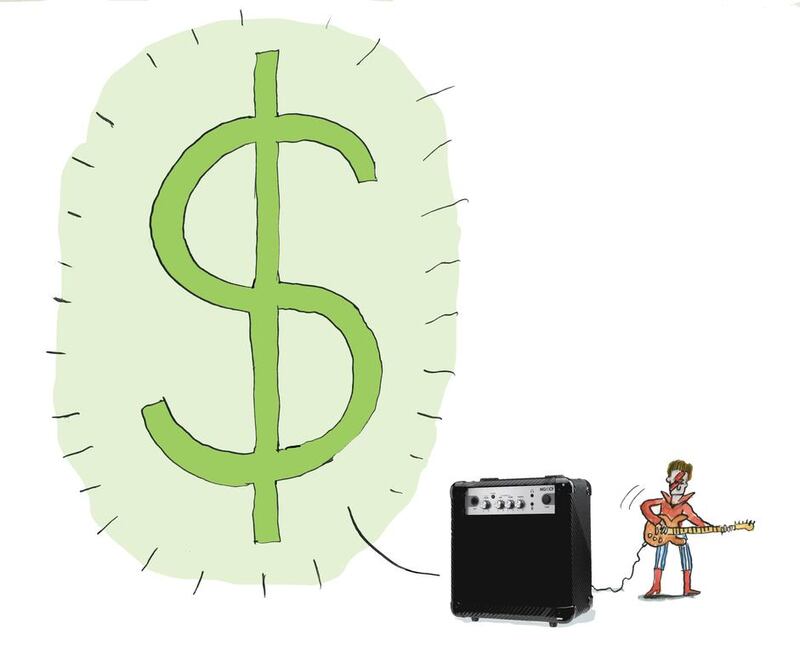I thought I'd drag out the adulation of David Bowie a bit longer by saving this article for now.
What a legend. And clever. His last work, Blackstar, posthumously landed him his first No 1 album.
You might be wondering why I mention him in a money column. It's because the great man excelled at figuring out, and benefiting from, opportunity. Especially financial opportunity.
More specifically, he saw how opportunity cost would work in his favour, and in doing so made financial history. That was back in 1997, when he got big business to put their money, as well as their faith, into rock music.
Not afraid to experiment with his look, his music, his image, Bowie was also the force behind creating the first investment backed by music: the Bowie Bond. It paid out 7.9 per cent every year for 10 years, which was a better rate of return than US Treasury bonds at the time. But unfortunately for people like you and me, it didn't make it into the hands of fans, but stayed within the grasp of institutional investors.
Bowie got a lump sum - about US$55 million - up front instead of the royalties he would have earned over those years. Yes, the royalties could have added up to a lot more, but cash in hand meant he could make investment decisions in 1997 instead of a decade later. The royalties he forfeited were used to create the funding for the bonds. Bowie held on to the intellectual property rights, which meant that all ownership reverted back to him at the end of the bond's lifetime, thus securing his and his family's financial future forever.
You might not have intellectual property you can convert into an investment tool, but you might have other things you can sell today that will give you access to a lump sum. This cash gives you financial muscle, and decision-making powers. You would forfeit potential (theoretical) future gains to cash in now.
It could be a property that has appreciated in value significantly, and the current investment climate means that money would buy you a lot more. Even if your investment has not increased monetarily, the circumstances on the ground could mean that cashing in is best for you.
Sometimes we get locked into financial situations because we do not want to lose money we put in to an investment. But that money has been spent, and holding on for a specific return puts you at risk - not only of staying with a bad investment decision purely for emotional reasons, but also because it robs you of the options cash gives you today.
This is opportunity cost. It's something that is often overlooked.
One definition of it is "the loss of potential gain from other alternatives when one alternative is chosen".
What could Dh200,000 or Dh2 million that you have locked in real estate, or anything else, buy you today? Could it be that you would get more for your buck if you had liquidity? If so, what are the reasons for you holding on to whatever you've got your money in?
Don't get me wrong, I'm not advocating that you sell what you own or release cash. I'm suggesting that you look at opportunity cost - what you can do with money today compared to holding on to your asset for the longer term.
Bowie used his upfront payment to invest in blue chip companies and buy prime property investments that shot up in value over the years.
That's not to say that he always got things right. He also set up his own credit card, became an internet entrepreneur and set up a bank, Bowiebanc. (No, I hadn't heard of it either until I researched it.)
Ever the maverick, Bowie learnt a few financial lessons the hard way when he discovered the money he made wasn't in his account - his card was once declined when paying for lunch in the '70s, and soon after he found out that he didn't own his own creations in full. In fact, his biography states he was down as an employee of the man who managed his affairs - Tony Defries. The Bowie family was even padlocked out of their home at one stage because of financial problems.
But from all of this emerged a financially astute Bowie. He developed an iron grip on his money from that point until the day he died. And so it came to pass that the man who sold his world bought himself a whole lot of financial security for himself and his family.
My takeaway is this: be in control of your own financial affairs, including assessing the opportunity cost of sticking with your current investment strategy. What would cash in hand today give you that cash tomorrow would not?
Nima Abu Wardeh is the founder of the personal finance website cashy.me. You can reach her at nima@cashy.me and find her on Twitter at @nimaabuwardeh
David Bowie: learn from the man who sold the world
The great man excelled at figuring out, and benefiting from, opportunity. Especially financial opportunity, writes Nima Abu Wardeh.

Editor's picks
More from the national




